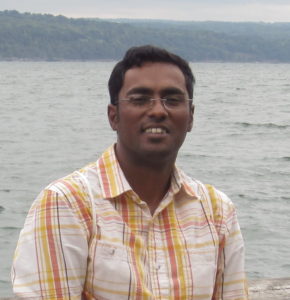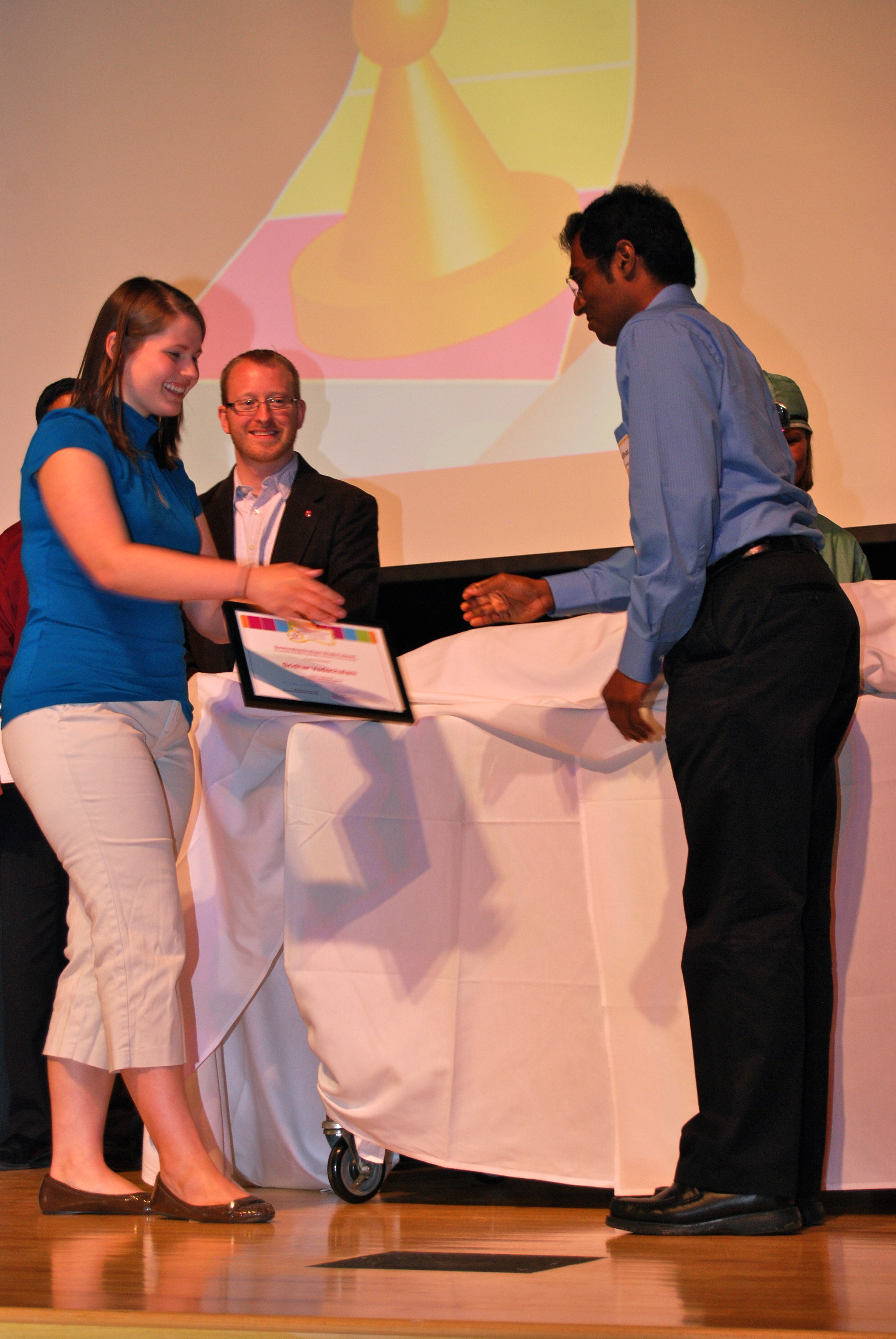The “Advocating for Science” symposium and workshop is taking place at MIT September 16-17, 2016, to enable junior scientists to advocate for science. The purpose of the meeting is to give an opportunity to those with a passion for advocating for science to develop their advocacy skills, meet like-minded junior scientists and develop focused efforts together to effect positive change.
To try to extend this meeting beyond the Boston area, we recently put out an application call for travel scholarships for attendees from further afield. Following interviews with our Kansas City Area Life Sciences Institute Travel Award Recipient, Alex Erwin, and Advocating for Science Travel recipients Holly Hamilton, Katherine Simeon, Adriana Bankston, and Tess Eidem, here is our next interview with Sridhar Vedachalam:
Sridhar Vedachalam is a Postdoctoral Fellow at the Johns Hopkins Water Institute at Johns Hopkins Bloomberg School of Public Health. His research is centered on water and wastewater infrastructure issues including assessment, planning, financing, use, and regulation. He is particularly interested in understanding how individuals and municipalities make decisions on water infrastructure. Sri received his PhD in Environmental Science and MS in Mechanical Engineering and Environmental Economics, all from The Ohio State University.
Tell us a little about your career path so far and what you are currently working on.
I have had a convoluted path to where I am today. After my undergraduate degree in Mechanical Engineering, I worked for a year at India’s largest construction firm. I came to The Ohio State University for an MS in Mechanical Engineering, and during that time got involved in student advocacy and community activism. These engagements got me interested in social development, and I wanted to find a way to pivot my career into a new direction. I got admitted to an interdisciplinary PhD program in Environmental Science that blended my background in engineering with my new interests in economics and policy. For my dissertation, I worked on an interdisciplinary approach to wastewater management in rural Ohio with perspectives from engineering design, economics, public attitudes and regulatory framework.
During my postdoc at Cornell University, I focused on community decision-making and policy approaches related to domestic water and wastewater infrastructure issues. To complement my expertise in US water issues, I took my current position as a postdoctoral fellow at Johns Hopkins School of Public Health to work on water, sanitation and hygiene in middle- and low-income countries in Africa and Asia.
How did you get interested in advocacy work/science policy?
During graduate school, I represented my college on the University Senate, and led the local chapter of an international nonprofit, “Association for India’s Development.” After my PhD, I took a postdoc position at the New York State Water Resources Institute at Cornell University. Fittingly for me, it was meant to be an interdisciplinary position with the opportunity to shape it within the larger mission of the Institute. But it turned out to be a much more than a traditional postdoc. The role was a mix of research, applied policy, administration, advocacy/lobbying and public outreach. The Institute was funded by both federal appropriations and New York’s state budget through a collaboration with the Hudson River Estuary Program.
Not only did we receive funds for our own research, but we were also the federally mandated water institute in New York that granted funds to external researchers statewide. Therefore, at a minimum, we had to showcase our work and those of our grantees to policymakers at both federal and state levels to ensure our institute and the sponsored programs maintained the annual funding. This involved visiting Capitol Hill annually and meeting with Congressional staff associated with our state’s senators, our local Congressional Rep and those involved with key committees. Apart from these annual meetings, we also maintained regular interactions with state and municipal agencies whose jurisdictions intersected with our work, and urged them to consider evidence-based approaches in their decision-making based on outcomes from our research.
I also received a grant from the New York State Pollution Prevention Institute to conduct four educational workshops in two New York counties for homeowners and local decisionmakers regarding wastewater management of onsite septic systems. I collected a panel of experts, consisting of local and external individuals with a range of experiences, and worked with community associations and county authorities to organize these workshops. The sessions were video recorded and hosted on YouTube for wider coverage.
What experiences have you had in policy so far and how have they shaped/changed your scientific interests/aspirations?
During the Hill visits, I found the Congressional staffers to be knowledgeable, and willing to listen to our work and consider our funding request (in Congressional parlance, the ‘ask’). These visits proved useful as we received quite a few emails and phone calls from their offices during the rest of the year for expertise regarding ongoing legislation. We also had a private meeting in Albany, NY with a US Congressman representing the state capital and surrounding areas, who was very much interested in water issues. Originally scheduled to last 45 minutes, the Congressman spent twice as much time and had to be weaned away by his staff. The open outlook exhibited by these individuals who are in the vanguard of making big policy decisions was certainly a surprising and refreshing experience for me.
Perhaps the most direct impact of my work on policy was related to a proposed water desalination project being set up by a private water company just north of New York City, that was becoming controversial among the local residents. My peer-reviewed article on the topic was picked by a state Assemblyperson who cited whole paragraphs from the article in her letter to the state regulatory agency considering the project. Although my article did not support or condemn the project, it raised some procedural questions, and the legislator used that to support her arguments. Subsequent letters from other local legislators continued to cite my paper. This experience, along with the interactions with policymakers, indicated to me the bridge academics can play to bring research into practice and policy. They have strengthened my inclination to seek a policy-oriented career.
What are your future goals?
As I move forward in my career, I wish to work on water policy issues. Contrary to popular perception, public policy is shaped at various levels, from federal decisions to opinions of the general public and all levels in between. I hope to continue to promote evidence-based decision-making at one or many of the public policy levels. The academic tenure and promotion process is not designed to incentivize working with external stakeholders like communities, policymakers, and the media. This thinking permeates from the faculty onto the graduate students. I want to motivate young scientists to promote their research and find avenues to share and implement their work outside academic circles.
What do you hope to get out of coming to the meeting in Boston?
I am passionate about the training and benefits received by PhD students and postdocs. Universities, departments and advisors (barring a few exceptions in all the three structures) are doing a great disservice to young researchers by only training them for academic careers that don’t exist in enough numbers. Coming out of graduate school/postdoc, very few researchers are systematically prepared to build a professional network and market their skills outside the university. The ones that are successfully able to do so rely on a hodge-podge of skills and experiences that they gathered along the way, not as a result of an institutional process.
Furthermore, as an international scholar, I am uniquely aware of the challenges faced by young researchers who have additional constraints of creating new networks and seeking opportunities in a foreign country, not to mention navigating the complex immigration system. Through interaction with peers and other advocates, I wish to discuss and formulate effective strategies to champion these causes through collective writing, action and advocacy. I would also like to highlight the role young scientists can play in bringing their research outcomes into practice or policy.






Trackbacks/Pingbacks